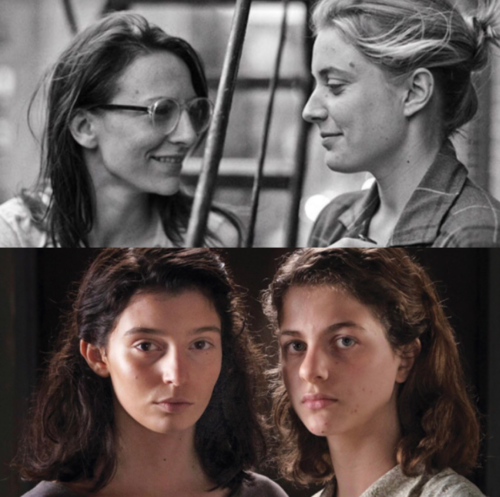Perhaps in some way it’s no coincidence that Frances Ha (with Lady Bird secretly serving as the eponymous character’s origin story) was released to theaters the same year as Elena Ferrante put out the first book in her Neapolitan novels, My Brilliant Friend, in 2012. While, of course, there’s no comparison to growing up in abject poverty in post-war Naples versus being First World New York City poor (where somehow even an impromptu trip to Paris is financeable with the white girl’s best friend and worst enemy, a credit card), the inherent messages in both regarding friendship and soul mates is undeniable in sharing a kinship.
Like Elena Greco (played by Margherita Mazzucco in the HBO series), Frances is the type of person more concerned with her best friend’s well-being and opinion than any man that might happen to be in her life or claim to love her. This is immediately made evident when Frances’ boyfriend, Dan (Michael Esper), asks her if she wants to move in with him at the beginning of the movie and she replies uncertainly with, “Well, I don’t know. I promised Sophie I’d stay through the lease…and she’ll probably want to renew it.” The Sophie (Mickey Sumner) in question is the Lila Cerullo (Gaia Girace) of the narrative–the dark-haired, brilliant and self-assured alpha friend who inspires and amazes her light-haired counterpart.
While Frances and Sophie forged their bond in the college years, Elena and Lila began their incontrovertible tie to one another in childhood, growing up in the chaos of a plebeian, Camorra-run rione on the periphery of Naples. Understanding one another in a way that nobody else can, each girl’s intelligence (and according desire to escape) makes them both comrades and occasional rivals. In Frances and Sophie’s case, the ironclad connection stems from an almost domestic partnership, which Frances bills as, “We are like a lesbian couple that doesn’t have sex anymore.”
For Sophie, however, this soon isn’t the case as she goes down the track she once seemed so defiant against (much like Lila, when her ambitions were still toward nurturing the mind as opposed to wielding the body): convention and eventual marriage to her longtime, erstwhile sidelined boyfriend, ironically nicknamed Patch (Patrick Heusinger). But right before Frances is delivered the death blow of Sophie’s first phase of moving on (by deciding to take the chance to transfer to her dream neighborhood, Tribeca [which one refuses to write out in its desired way of TriBeCa]), she sweetly asks, “Tell me the story of us.” Sophie happily returns, “We are gonna take over the world.” Frances interjects, “You’ll be this awesomely bitchy publishing mogul,” to which Sophie adds, “And you’ll be this famous modern dancer… and I’ll publish a really expensive book about you.” Frances throws in the footnote, “That d-bags we make fun of will put on their coffee tables.” Sophie then projects, “And we’ll co-own a vacation apartment in Paris,” leaving it open for Frances to insist, “And we’ll have lovers,” so that Sophie can make sure to include the caveat, “And no children.”
Of course, it can’t work out that way in the long run, with one friend in a once inseparable duo of this nature always absconding for another path. And since Sophie has climbed the social ladder of New York in her career and lodging, it only makes sense for her to cry “love” for Patch and get engaged.
Despite being accepting of “losing” Sophie, Frances’ underlying anger (at one point lashing out in public at Sophie and Patch before fleeing with her expensive bottle of vodka) actually stems from bereaving the loss of a person she knows she’ll never be able to re-create the same connection with. As she phrases it, “It’s that thing when you’re with someone…and you love them and they know it…and they love you and you know it… but it’s a party and you’re both talking to other people…and you’re laughing and shining and you look across the room and catch each other’s eyes…but not because you’re possessive…or it’s precisely sexual…but because…that is your person in this life. And it’s funny and sad, but only because this life will end, and it’s this secret world that exists right there in public, unnoticed, that no one else knows about. It’s sort of like how they say that other dimensions exist all around us, but we don’t have the ability to perceive them.”
It is this exact philosophy that also forges the link between Elena and Lila, no matter what happens to them in their lives, or how divergent their narratives become from the original intent of “the story of us,” now bifurcated into “the story of Elena” and “the story of Lila.” Except, the truth is, you can’t talk about one without bringing the other into it. And the same goes for Frances and Sophie, whose intimacy can never really be rattled by the presence of a penis. Try as it might to snake charm with illusions that anything can ever outlast the unique adhesive of the type soul mates borne out of friendship (female or otherwise).





















